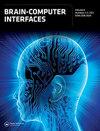Two sides of the same coin: adaptation of BCIs to internal states with user-centered design and electrophysiological features
IF 2.1
Q3 ENGINEERING, BIOMEDICAL
引用次数: 7
Abstract
The ideal brain–computer interface (BCI) adapts to the user’s state to enable optimal BCI performance. Two methods of BCI adaptation are commonly applied: User-centered design (UCD) responds to individual user needs and requirements. Passive BCIs can adapt via online analysis of electrophysiological signals. Despite similar goals, these methods are rarely discussed in combi-nation. Hence, we organized a workshop for the 8th International BCI Meeting 2021 to discuss the combined application of both methods. Here we expand upon the workshop by discussing UCD in more detail regarding its utility for end-users as well as non-end-user-based early-stage BCI development. Furthermore, we explore electrophysiology-based online user state adaptation concerning consciousness and pain detection. The integration of the numerous BCI user state adaptation methods into a unified process remains challenging. Yet, further systematic accumula- tion of specific knowledge about assessment and integration of internal user states bears great potential for BCI optimization.同一枚硬币的两面:以用户为中心的设计和电生理特征使bci适应内部状态
理想的脑机接口(BCI)能够适应用户的状态,从而实现最佳的BCI性能。BCI适应的常用方法有两种:以用户为中心的设计(user -centered design, UCD)响应个人用户的需求和要求。被动脑机接口可以通过在线分析电生理信号来适应。尽管目标相似,但很少将这些方法结合起来讨论。因此,我们为2021年第八届国际脑机接口会议组织了一个研讨会,讨论两种方法的结合应用。在这里,我们通过更详细地讨论UCD对最终用户以及非基于最终用户的早期BCI开发的效用来扩展研讨会。此外,我们探索基于电生理学的在线用户状态适应,涉及意识和疼痛检测。将众多BCI用户状态适应方法集成到一个统一的过程中仍然具有挑战性。然而,进一步系统地积累有关内部用户状态评估和集成的具体知识,对BCI优化具有很大的潜力。
本文章由计算机程序翻译,如有差异,请以英文原文为准。
求助全文
约1分钟内获得全文
求助全文

 求助内容:
求助内容: 应助结果提醒方式:
应助结果提醒方式:


